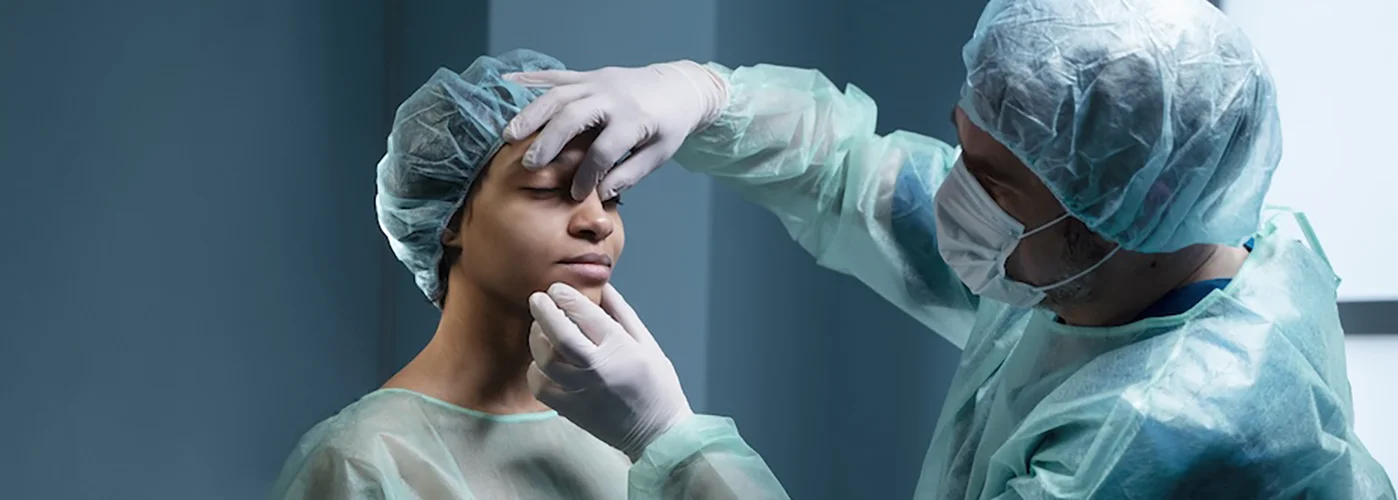
Functional endoscopic sinus surgery (FESS) a minimally invasive procedure used to diagnose and treat problems related to the nasal cavity. An ENT specialist inserts a small telescopic instrument into the patient’s nostril to visualise the area prepared for operation. Specialised tools are then used to effectively restore drainage and ventilation between the nose and sinuses.
Usually, traditional medical therapies, such as antibiotics, nasal drops or tablet treatments, are proposed before sinus surgery (FESS). If no improvement is seen, your ENT specialist may recommend a CT scan to evaluate your condition to decide whether FESS is necessary. This procedure allows your specialist to give an accurate diagnosis in order to propose more effective steps for recovery.
Most open sinus procedures require incisions to be made to the face, often leaving patients with visible scarring and the need for nasal packing.
FESS instead provides surgeons with a better view of your nose and sinuses so that any surgical intervention is almost exclusively conducted through the nostrils, leaving no visible signs and minimal scarring. This allows the patient to experience less postoperative pain and bleeding, allowing for a speedier recovery.
FESS also reduces the need for nasal packing, allowing patients to breathe normally through their nose with little to no discomfort.
Sinus surgery is typically needed when chronic sinusitis or other sinus issues do not respond to medical treatments such as medications or lifestyle changes.
Persistent symptoms like nasal congestion, facial pain, headaches, and difficulty breathing through the nose that continue despite these treatments may indicate the need for surgery.
Sinus surgery involves various techniques to treat chronic sinusitis and other sinus issues. Here are the main types of sinus surgery:
These surgeries can be tailored to your specific sinus condition, helping improve symptoms and overall sinus health. Consult the ENT specialists at Gleneagles Hospital to determine the best approach for you.
Before your sinus surgery, ensure you undergo a medical evaluation, inform your provider of all medications, and follow preoperative instructions, including fasting if required.
Avoid smoking and alcohol and arrange transportation if you will be under general anaesthesia. Prepare your home for recovery with supplies like prescribed medications and nasal sprays.
At Gleneagles Hospitals, we offer personalised treatment plans tailored to your unique needs. Our ENT specialists will recommend the best type of surgery according to your specific condition and requirements, ensuring you receive the most effective care. These procedures are customised to address specific sinus conditions, improving symptoms and enhancing overall sinus health.
Functional Endoscopic Sinus Surgery (FESS)
FESS is commonly used to treat severe sinus conditions. Here’s an overview of the process:
Balloon Sinuplasty
This minimally invasive procedure is an alternative to FESS. Here’s what to expect:
Caldwell Luc Surgery
This surgery is typically performed when other methods haven’t resolved sinus issues. The procedure involves:
After sinus surgery, your recovery depends on the type of anaesthesia used. If you received general anaesthesia, you would rest in a recovery room until it wears off. You can go home immediately after the procedure if you have local anaesthesia.
Before you leave, your ENT specialist will give you detailed care instructions. They may prescribe pain medication to manage mild to moderate pain for about a week after surgery and antibiotics to prevent infection.
Gleneagles Hospitals welcomes all patients seeking comfort and healing from sinus related issues. Our team of skilled specialists and friendly staff assures you of the utmost comfort and welcoming care during your sinus surgery treatment. Give us a call today.


Wait a minute